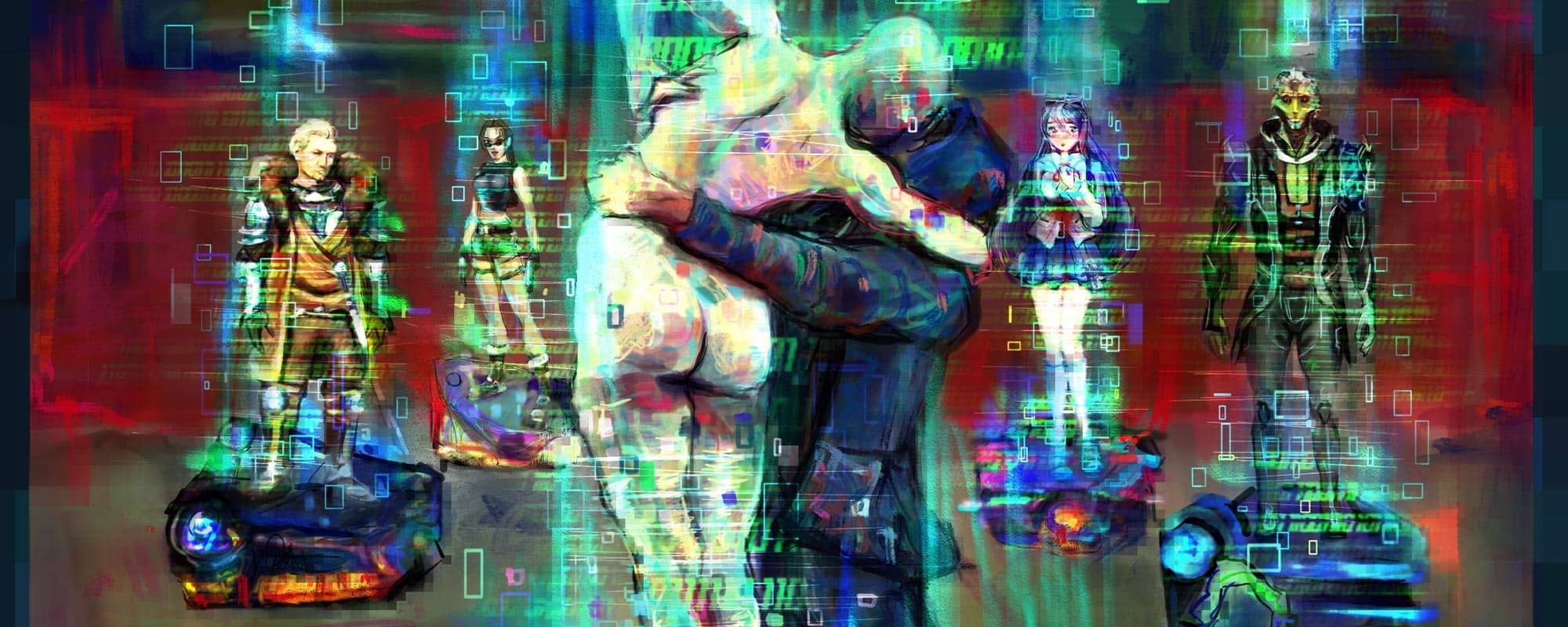Video game characters can be increasingly complex and lifelike. Some can even simulate deeply believable and complex emotional situations. We immerse ourselves in their stories, but could we ever fall in love with them? That is the question posed by Dr Renata Ntelia in her PhD thesis.
Have you ever felt attracted to a computer program? Maybe not Microsoft Word or Adobe Photoshop. But what about a fully realised virtual human with digitally modelled skin and programmed voice lines? ‘My research tries to answer the question of whether humans can fall in love with artificial humans,’ explains Dr Renata Ntelia, Lecturer of Games, School of Computer Science, University of Lincoln. She questions if we could love interacting lines of code. The answer is far more nuanced than she expected.
‘Love is such a universal experience,’ she observes. ‘Everyone has some sort of experience with it.’ At a surface level, she explains, there is plenty of evidence that love plays a role in video games. For starters, there are recorded instances of real people falling in love through their online personas in games such as Second Life or World of Warcraft. However, that’s not the real interest of Dr Ntelia’s research. Her work concerns non-player characters, or NPCs for short, which include every character not controlled by a player.
Can we fall in love with an NPC? ‘Not yet’, posits Dr Ntelia. ‘Unlike other emotions, love requires reciprocity. It requires that someone can love you back. Video game characters are either coded to love you or not. They don’t have this ability to choose not to love you.’
In the future, it’s anyone’s guess with the rise of artificial intelligence. Nonetheless, Dr Ntelia points out that video game developers are wary of giving too much self-sufficiency to NPCs. Developers usually fear that it may take away some sense of agency from the player—the ability for the player to feel that they have an impact on the game world through their decisions—and make the experience boring. ‘Even though it is a technological question’, adds Dr Ntelia, ‘it is very much an anthropological question as well. We need to consider if we accept having people we create reject us and the effects that might have on our perception of love.’

Love is Also Romance
Despite that, the investigator touches upon different conceptions of love, namely in the realm of narratives. Video games have often been misrepresented as an inferior medium for telling stories. The late movie critic Roger Ebert famously wrote an article entitled ‘Video games can never be art.’ Whether we agree with him or not, we must observe video games at their full potential. Therefore, Dr Ntelia’s work opens the debate on the boundaries of media narratives. She proposes that video games can generate great emotional stories, akin to Romeo and Juliet or Casablanca, that can involve the player. As such, she highlights that, despite not enabling full love experiences, video games can make us feel romantic love. ‘Like every other medium, we can still experience romance in video games,’ declares the investigator, ‘which is a fictional representation of love—very much coded and pre-configured. The difficult thing while we analyse love in games is that they create deeply personal experiences.’ This entails an approach that considers a video game as a complex whole. For that purpose, Dr Ntelia used the player involvement model developed by her supervisor, Prof. Gordon Calleja. ‘It brings the multi-modality of games to the forefront. It also allows me to talk about specific parts of it while also retaining the bigger picture in mind,’ explains Dr Ntelia. She combined this model with affect theory to account for the way a game affects its players—not simply as code, narrative, or visual elements, but as a compact experience. This complexity also required a multidisciplinary approach. Dr Ntelia had to rely on a wide array of disciplines to give her thesis a strong foundation. Among other fields of study, she delved into psychology, evolution, philosophy, and media analysis. Bringing together that amount of diversity was one of the major challenges of her work. Apart from research, her inspiration encompassed literature, movies, and video games, which were an important starting point.

Affect theory aims to understand how emotions, feelings, and moods shape individual and collective experience. It examines how affective processes influence perception, cognition, social interaction, and communication and how they are shaped by cultural, historical, and political contexts.
The Gaming Researcher
This was more than an academic investigation; it was a passion project. Dr Renata Ntelia speaks about video games with an endearing voice. As she puts it, she is a gamer herself, but love was not a theme she had initially considered as an academic endeavour. It came up as a gap in research after continuous discussions with her supervisors. Her research is, to a large extent, autoethnographic. ‘My gaming experience also informed my research,’ says Dr Ntelia. ‘My thesis is built upon autoethnography because it has been concluded that bringing in your own game experiences is a valid means to start researching in the field of video game studies.’
Despite its value, the personal experience created plenty of challenges. Dr Ntelia acknowledges that everyone has an opinion about love, and she is not immune to that. ‘The research creates specific tensions,’ she admits, ‘because it’s so personal. You need to find a way to talk about it objectively while also retaining this essential personal element. You can’t ignore it, because that doesn’t do it justice. You need to have balance.’
In her gaming habits, Dr Ntelia has played some games where love is an integral part. She only laments the lack of such experiences in the medium. ‘There are not a lot of games that treat romance and love within their content,’ adds the researcher. There are still misconceptions in the industry that video games are seen as a teenage boy’s pastime, which could not be further from the truth. Furthermore, this perpetuates the false assumption that adolescent males are not interested in romance and love, which is hardly the case. While love is not the central focal point of many video games, we do find ourselves attached (if not necessarily ‘in love’) with NPCs. As Dr Ntelia points out, ‘even though there are not that many games concerned with love and romance, I’ve still managed to experience romantic feelings within games, like many other players.’
This article was produced in collaboration with the University of Malta’s Doctoral School.
Banner image courtesy of Aphrodite Theodora Andreou





Comments are closed for this article!